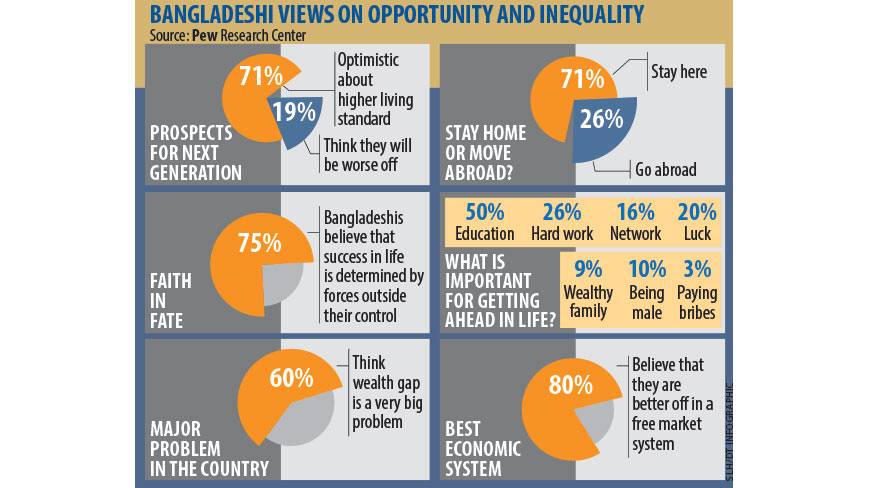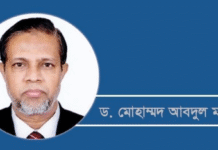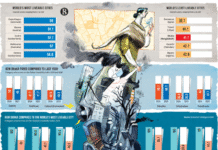The survey, conducted from March 17 to June 5 this year, involved 48,643 respondents in 44 countries
More than two-thirds of Bangladeshis believe their children will be better off than they are, according to a survey carried out by a US-based think tank.
Seventy-one percent of Bangladeshis are optimistic that the next generation will have a higher standard of living than they have, according to research conducted by the Pew Research Centre released on Thursday. Nineteen percent believe their children will be worse off.
The survey, conducted from March 17 to June 5 this year, involved 48,643 respondents in 44 countries.
In Bangladesh the organisation took face-to-face interviews of 1,000 adults between April 14 and May 11.
Researchers said optimism was linked with recent national economic performance.
“Countries that have enjoyed relatively high levels of growth in recent years also register some of the highest levels of confidence in their children’s economic futures,” the report said.
Bangladesh has enjoyed a growth rate of around six percent for a decade.
By contrast the French, Japanese and British are particularly downbeat about the future. Nearly two-thirds of Americans felt the same, the report added. These countries have been affected by recession since 2008.
Stay or Move Abroad
Most Bangladeshis also feel that their children would have a better life if they remained in the country.
The report found that 71 percent of respondents would recommend staying in Bangladesh to young people who want a good life. Twenty-six percent said the opposite.
People in developing nations generally believe that it is better for young people who want to have a good life to stay in their home country rather than move to another country, the report said.
Success Out of Control
About 75 percent Bangladeshis believe that success in life is determined by forces outside their control.
This belief is held in most other developing economies. In advanced economies, half or fewer in six of the 10 countries surveyed agree that success was out of their control.
“Americans are the least likely to say they are not the masters of their fate (40%), one of the lowest percentages among the 44 countries surveyed,” the report said.
In most developing economies, a majority of respondents say success is determined by outside forces, including 74% in Bangladesh and 67% in Ghana. Nicaraguans are the least likely among developing countries to agree with this proposition.
Education and hard work
Fifty percent of Bangladeshis believe that education is very important for getting ahead in life while 26 percent think that hard work is the most important thing.
Sixteen percent of people in Bangladesh feel that knowing the right people is the most important factor while 20 percent say being lucky is the most important thing to improve in life.
Nine percent believe that belonging to a wealthy family is the most important factor, 10 percent said being a male was the key factor and 3 percent suggested the giving bribes is the most important factor in improving one’s economic situation.
Inequality a major problem
Around 60 percent of Bangladeshis feel that the gap between the rich and the poor is a very big problem in the country.
Most Bangladeshis attribute government policy, wages and the education system as the major reasons for the wealth gap.
Twenty percent of respondents from Bangladesh say the trade and taxation systems are major problems.
Over 80 percent of Bangladeshis believe the taxation system would be an effective instrument in reducing inequality.
Forty percent suggest that lowering taxes will reduce the gap while 41 percent feel that increasing taxes will have the same result.
Free market best
Eighty percent of Bangladeshis support the free market and believe they are better off because of it.
By contrast, advanced economy respondents are somewhat more divided over the free market.
In most advanced economies, people who say the gap between the rich and poor is a very big problem are much less supportive of the free market than those who worry less about inequality, the report said.
A month ago, the Pew Research Centre released a report saying that 71 percent of Bangladeshis felt the economic condition was good while 28 percent said it was not good.
The report released on September 9 said 54 percent of Bangladeshis were satisfied with the way things were going in the country while 44 percent were dissatisfied. Sixty-six percent of Bangladeshis believed then that economic conditions would improve in the next 12 months, the report said.
Source: Dhaka Tribune










